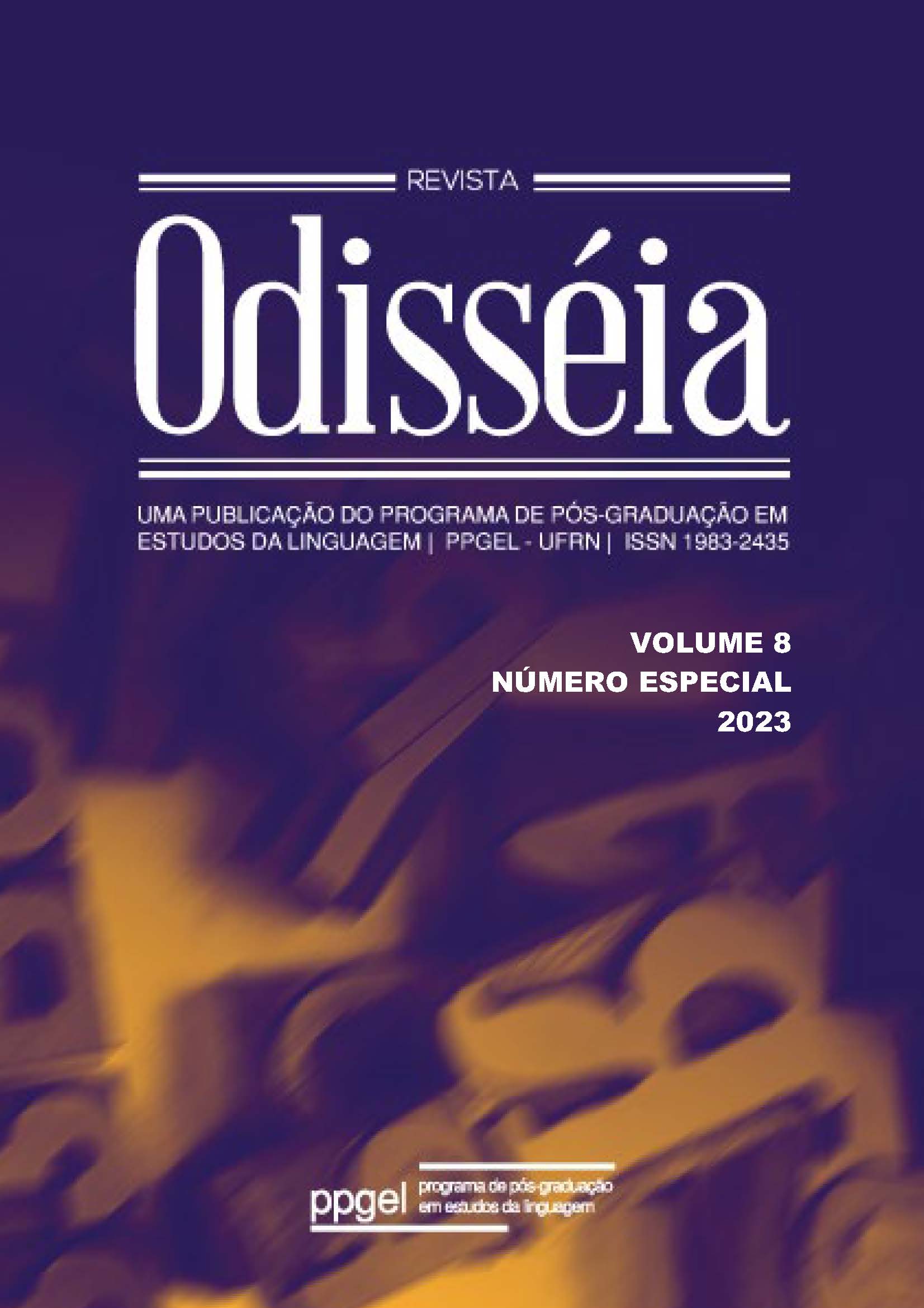A falsa alegria no Pequeno teatro da felicidade (1977), de Márcio Souza
DOI:
https://doi.org/10.21680/1983-2435.2023v8nEspecialID32359Palavras-chave:
Teatro., Ditadura., Testemunho., Márcio Souza.Resumo
Os (des)caminhos da política brasileira em períodos autoritários e a metalinguagem teatral constituem as bases que sustentam a peça Pequeno teatro da felicidade, de Márcio Souza. Partindo da revolta da Cabanagem, a mesma tece um painel crítico acerca das arbitrariedades da ditadura civil-militar. A análise, de cunho qualitativo, leva em conta sua estrutura e as temáticas ligadas à crítica política, tendo como objetivo enfatizar sua atualidade no tocante às ameaças à democracia. O aporte teórico se funda nas contribuições literárias e ensaísticas de Márcio Souza, na sua fortuna crítica, na teoria teatral, no pensamento em torno do autoritarismo e da escrita testemunhal. Assim, a peça mimetiza os regimes opressores em geral e sua gana assassina, mas também a resistência e a luta pela liberdade, tributando à arte um papel fundamental frente à barbárie.
Downloads
Referências
BENJAMIN, Walter. Magia e técnica, arte e política: ensaios sobre literatura e história da cultura. Trad. Sergio Paulo Rouanet. Prefácio Jeanne Marie Gagnebin. 7. ed. 11. reimpres. São Paulo: Brasiliense, 2008. (Obras escolhidas, I).
BRASIL. Ato institucional nº 5, de 13 de dezembro de 1968. São mantidas a Constituição de 24 de janeiro de 1967 e as Constituições Estaduais; O Presidente da República poderá decretar a intervenção nos estados e municípios, sem as limitações previstas na Constituição, suspender os direitos políticos de quaisquer cidadãos pelo prazo de 10 anos e cassar mandatos eletivos federais, estaduais e municipais, e dá outras providências. Brasília, DF: Presidência da República, [1968]. Disponível em: http://www.planalto.gov.br/ccivil_03/ait/ait-05-68.htm. Acesso em: 06 nov. 2022.
BULFINCH, Thomas. O livro de ouro da mitologia: (a idade da fábula): histórias de deuses e heróis. Trad. David Jardim Jr. 2. ed. Rio de Janeiro: Ediouro, 1999.
FILGUEIRAS, Aldisio Gomes. Márcio Souza, a conexão reencontrada. In: SOUZA, Márcio. Teatro seleto. Manaus: Reggo/Academia Amazonense de Letras, 2018, p. 11-12. (Coleção Pensamento amazônico. Série Violeta branca, 13).
LINS, Osman. Evangelho na taba: outros problemas inculturais brasileiros. São Paulo: Summus, 1979.
PAVIS, Patrice. Dicionário de teatro. Trad. sob a direção de J. Guinsburg e Maria Lúcia Pereira. 3. ed. São Paulo: Perspectiva, 2008.
RAMOS, Luiz Fernando. O parto de Godot e outras encenações imaginárias: a rubrica como poética de cena. São Paulo: Hucitec/Fapesp, 1999.
SANT’ANNA, Catarina. Metalinguagem e teatro: a obra de Jorge Andrade. Cuiabá: Editora da UFMT, 1997.
SELIGMANN-SILVA, Márcio. Testemunho e a política da memória: o tempo depois das catástrofes. Projeto História, São Paulo, v. 30, n. 1, p. 71-98, jan./jun. 2005. Disponível em: https://revistas.pucsp.br/index.php/revph/article/view/2255. Acesso em: 26 dez. 2022.
SHAKESPEARE, William. Hamlet, Rei Lear, Macbeth. Trad. Barbara Heliodora. São Paulo: Abril, 2010. (Clássicos Abril Coleções, 10).
SOUZA, Márcio. Ofício de escritor. [Entrevista cedida a Antonio Fernando De Franceschi e Rinaldo Gama]. In: Cadernos de literatura brasileira: Márcio Souza. São Paulo: Instituto Moreira Salles, n. 19, dez. 2005, p. 23-49.
SOUZA, Márcio. O palco verde. São Paulo: Marco Zero, 1984.
SOUZA, Márcio. Pequeno teatro da felicidade. In: SOUZA, Márcio. Teatro II. Textos revistos e estabelecidos pelo autor. São Paulo: Marco Zero, 1997. p. 9-63.
Downloads
Publicado
Como Citar
Edição
Seção
Licença
Copyright (c) 2023 Revista Odisseia

Este trabalho está licenciado sob uma licença Creative Commons Attribution-NonCommercial-ShareAlike 4.0 International License.

Este trabalho foi licenciado com uma Licença http://creativecommons.org/licenses/by-nc-sa/4.0

















